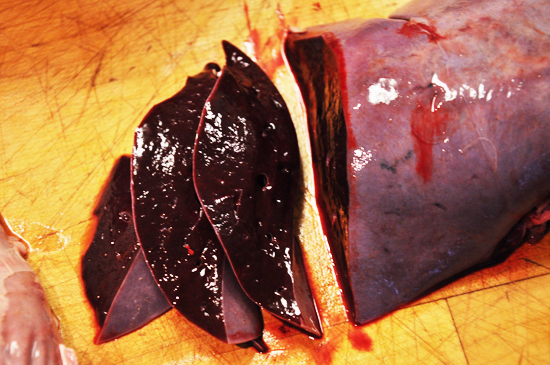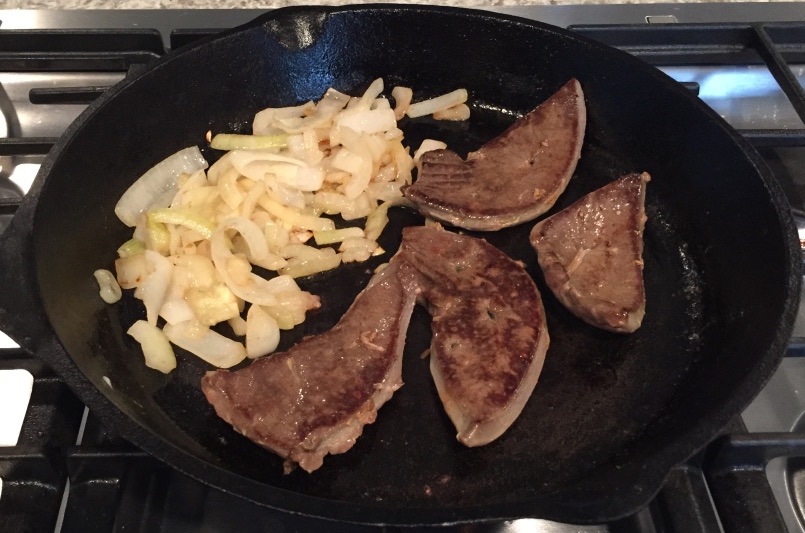Yes, you can eat deer liver. It is not only edible but also packed with nutrients.
Many people enjoy its unique flavor and health benefits. Deer liver is a rich source of vitamins and minerals. It offers high levels of vitamin A, iron, and protein. These nutrients are essential for maintaining good health. Eating deer liver can provide a boost to your diet.
It’s important to prepare it properly to enjoy its full benefits. In this blog post, we will explore the nutritional value, preparation methods, and potential risks of consuming deer liver. This will help you make an informed decision about including it in your diet. Whether you are a hunter or just curious, read on to learn more about this unique food.

Credit: georgiapellegrini.com
Introduction To Deer Liver
Deer liver is a delicacy enjoyed by many. It is rich in nutrients and offers a unique flavor. Some people are curious about its taste and benefits.
Eating deer liver can be a rewarding experience. This blog section explores its characteristics and popularity in cuisine.
What Is Deer Liver?
Deer liver is the liver of a deer. It is an organ meat, known for its distinct taste. The liver is often harvested during the hunting season.
It is packed with vitamins, minerals, and protein. Many hunters and food enthusiasts appreciate its nutritional value.
Popularity Of Deer Liver In Cuisine
Deer liver is popular in many cultures. It is used in traditional dishes and modern recipes. Chefs often prepare it with simple seasoning to highlight its flavor.
In some regions, deer liver is a seasonal treat. People enjoy it for its rich taste and health benefits. It is a sought-after ingredient in game meat cuisine.

Credit: venisonthursday.com
Nutritional Benefits
Deer liver is a nutritious food that offers many health benefits. It is packed with essential nutrients that can boost your overall well-being. Let’s explore its high protein content and rich vitamins and minerals.
High Protein Content
Deer liver is an excellent source of protein. A 100-gram serving provides about 20 grams of protein. This high protein content helps in building and repairing tissues. It also supports muscle growth and provides energy.
| Nutrient | Amount (per 100g) |
|---|---|
| Protein | 20g |
Rich In Vitamins And Minerals
Deer liver is rich in essential vitamins and minerals. It contains high levels of Vitamin A, Vitamin B12, and Iron. These nutrients are crucial for maintaining good health.
Vitamin A is important for vision, immune function, and skin health. A 100-gram serving of deer liver provides over 200% of the daily requirement for Vitamin A.
Vitamin B12 supports brain health and red blood cell formation. Deer liver is one of the best sources of this vitamin. A single serving meets your daily needs.
Iron is essential for blood production and energy levels. Deer liver provides a significant amount of iron, which can help prevent anemia.
| Nutrient | Amount (per 100g) |
|---|---|
| Vitamin A | Over 200% DV |
| Vitamin B12 | 100% DV |
| Iron | 50% DV |
Health Benefits
Deer liver is not just a delicacy; it is also a powerhouse of nutrients. Many people overlook it, but eating deer liver can offer various health benefits. This section will explore the benefits of adding deer liver to your diet.
Boosts Immune System
Deer liver is rich in vitamins A, B12, and iron. These nutrients play a vital role in strengthening your immune system. Vitamin A helps maintain healthy skin and mucous membranes. This acts as the first line of defense against infections. B12 aids in the production of white blood cells, which fight off pathogens. Iron supports the creation of hemoglobin, which carries oxygen to your cells. These nutrients combined make deer liver a great choice for immune health.
Supports Brain Health
Eating deer liver can also benefit your brain. It contains high levels of omega-3 fatty acids, which are essential for brain function. Omega-3s help improve memory and cognitive function. They reduce inflammation, which can lead to brain-related issues. The B vitamins in deer liver, especially B12, support the nervous system. These vitamins help produce neurotransmitters, improving mood and reducing the risk of depression. Including deer liver in your diet can help keep your brain sharp and healthy.

Credit: practicalselfreliance.com
Potential Risks
Deer liver can be nutritious. But it also carries potential risks. Consuming it without caution might affect your health. Understanding these risks is essential. Let’s explore the main concerns.
Heavy Metal Contamination
Deer liver might contain heavy metals. These metals accumulate from the environment. Hunters often target areas near industrial zones. Consuming liver from these areas can be risky. Lead and mercury are common contaminants. They pose serious health risks over time. Pregnant women should be extra cautious. Heavy metals can harm the developing fetus.
Cholesterol Concerns
Deer liver is high in cholesterol. A single serving can exceed daily limits. High cholesterol impacts heart health. It can increase the risk of heart disease. Individuals with existing conditions should avoid it. Consult a doctor before including it in your diet. Monitoring cholesterol levels is crucial. You can enjoy deer liver in moderation. But always be mindful of your overall intake.
Safety Tips For Consumption
Deer liver is a nutrient-dense organ meat. Eating it provides many health benefits. But it is essential to consume it safely. Below are some important safety tips to keep in mind.
Proper Sourcing
Ensure you source deer liver from a trusted supplier. This reduces the risk of contamination. Check the liver for any signs of disease. It should look fresh and be free from unusual spots.
| Supplier Type | Advantages |
|---|---|
| Local Butchers | Freshness, quality assurance |
| Hunting | Personal inspection, wild source |
| Online Retailers | Convenience, variety |
Always confirm the source follows proper hygiene standards. This ensures you get high-quality liver.
Safe Cooking Practices
Cooking deer liver properly is crucial. It ensures harmful bacteria are killed. Here are some steps:
- Wash the liver thoroughly under cold water.
- Remove any membranes and blood vessels.
- Soak the liver in milk for a few hours. This helps reduce bitterness.
Cook the liver to an internal temperature of at least 160°F (71°C). Use a meat thermometer to check. Avoid undercooking the liver. This prevents potential health risks.
Deer liver can be sautéed, grilled, or baked. Ensure it is fully cooked before consumption.
Preparing Deer Liver
Deer liver is edible and rich in nutrients. Cook it properly to enjoy its unique flavor and health benefits.
Deer liver can be a delicious and nutritious dish. Proper preparation ensures it tastes great and is safe to eat. Let’s explore how to clean and prep deer liver and some popular recipes to try.Cleaning And Prepping
First, rinse the liver under cold water. This removes any blood or debris. Pat it dry with paper towels. Next, trim away any visible membranes or connective tissues. This makes the liver more tender. Soak the liver in milk for an hour. This helps remove the gamey taste. After soaking, rinse and pat it dry again. Now, it’s ready for cooking.Popular Recipes
One popular recipe is pan-fried deer liver. Season the liver slices with salt and pepper. Heat a skillet with some butter. Cook the liver for about 3 minutes per side. Serve with onions and mashed potatoes. Another favorite is liver pâté. Blend cooked liver with onions, garlic, and butter. Spread it on toast or crackers. It makes a tasty appetizer. Lastly, try liver stew. Cut the liver into bite-sized pieces. Cook it with onions, carrots, and potatoes in a rich broth. Simmer until everything is tender. This hearty meal warms you up on a cold day. “`Cultural Significance
Deer liver has deep roots in many cultures, often seen as a delicacy. Indigenous tribes value it for its nutritional benefits and traditional practices. In some cultures, it symbolizes respect for the animal and nature.
Deer liver holds a special place in many cultures. It is not just food. It is tradition. People have used deer liver in rituals and celebrations for centuries. This rich history makes deer liver more than a meal. It is a link to the past.Traditional Dishes
Many cultures have traditional dishes featuring deer liver. In some European countries, deer liver is fried with onions. It is a simple yet cherished dish. In Asia, deer liver is often used in soups. These soups are believed to have health benefits. Native American tribes also have their unique recipes. They often incorporate deer liver into stews.Culinary Heritage
The culinary heritage of deer liver is vast. Recipes are passed down through generations. They reflect the region’s history and environment. Cooking methods vary, but the respect for the ingredient remains. In some cultures, eating deer liver is a rite of passage. It symbolizes strength and respect for nature. This deep connection enriches the culinary heritage of deer liver. “`Alternative Liver Options
When considering alternative liver options, deer liver is often overlooked. Yet, it offers unique flavors and nutrients. Deer liver can be a great addition to your diet. But how does it compare to other common liver options? Let’s explore the differences and benefits of beef and chicken liver.
Comparing To Beef Liver
Beef liver is a popular choice for many. It is rich in vitamins A, B12, and iron. Deer liver also boasts these nutrients, but with a milder taste. Let’s compare their nutritional values:
| Nutrient | Deer Liver (100g) | Beef Liver (100g) |
|---|---|---|
| Calories | 135 | 175 |
| Protein | 23g | 26g |
| Iron | 8mg | 6.5mg |
| Vitamin A | 22,000 IU | 20,000 IU |
Deer liver has fewer calories. It also contains slightly more iron and vitamin A. For those watching their caloric intake, deer liver is a better option.
Comparing To Chicken Liver
Chicken liver is another common alternative. It is known for its high vitamin A and folate content. How does deer liver stack up?
- Calories: Chicken liver – 167, Deer liver – 135
- Protein: Chicken liver – 24g, Deer liver – 23g
- Iron: Chicken liver – 9mg, Deer liver – 8mg
- Vitamin A: Chicken liver – 11,000 IU, Deer liver – 22,000 IU
Chicken liver has more iron and protein. Yet, deer liver offers double the amount of vitamin A. For those needing a vitamin A boost, deer liver is ideal.
Each type of liver has its benefits. Whether you choose beef, chicken, or deer liver, you are getting a nutrient-rich food. Deer liver stands out for its unique nutritional profile. Consider trying it in your next meal.
Frequently Asked Questions
Is Deer Liver Safe To Eat?
Yes, deer liver is safe to eat if properly cooked.
What Does Deer Liver Taste Like?
Deer liver has a rich, gamey flavor similar to beef liver.
How Do You Cook Deer Liver?
You can sauté, fry, or grill deer liver. Cook until firm.
Are There Health Benefits To Eating Deer Liver?
Yes, deer liver is rich in vitamins A, B, iron, and protein.
Can You Freeze Deer Liver For Later Use?
Yes, you can freeze deer liver. Wrap it well to prevent freezer burn.
Conclusion
Eating deer liver can be a healthy choice. It offers many nutrients. Always ensure it’s from a clean, safe source. Cook it properly to avoid health risks. Some may find the taste strong. Experiment with different recipes. Deer liver can be a unique addition to your diet.
Enjoy it in moderation for balanced nutrition.